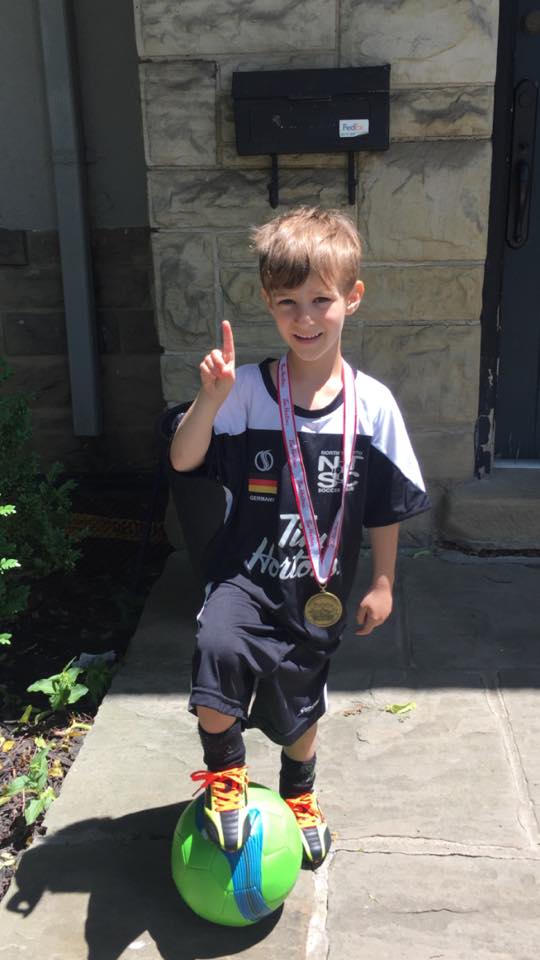Winning IS Everything: Why We Should Teach Our Kids To Be Competitive

I’ll admit, I’m not a good loser. Nor am I a good winner. I once—maybe twice—threw my backgammon board across the room, after losing. When my family went bowling, I got so angry at myself for not getting a strike that I literally fell to the floor, swearing. When I win? I have an annoying happy dance. I love to win so much, that even if I defeat my five-year-old at Connect Four, I can’t help but sing-song, ‘I won! I won! I won! You lose! You lose!’
Don’t worry. My kids still like to play with me, because it’s actually kind of funny to see Mommy’s reaction. It’s clear as crystal, to my children, that I much prefer winning than losing. Am I setting a bad example? I’m not sure I really care. Yeah, yeah, I know we’re supposed to teach our children that it doesn’t matter if they win or lose, as long as they tried their hardest. To a certain extent, I believe this. I also believe the statement, ‘As long as you had fun,’ to be true. But I think healthy competition is a good thing.
Why aren’t we allowed to teach our kids that winning is a good thing and something to celebrate? In the same vein, why can’t we teach our children that it’s okay to feel bad and sad about losing? I’m not talking about parents who go all cray-cray on coaches, screaming at their kids from the sidelines. I’m just saying that winning feels good and losing can feel bad and that both these emotions are something our children need to learn.
My 14-year-old daughter and I laugh every time before she has a swim meet or a ski race, and most recently after she joined a hockey team. On the days she competes, I will ask her, ‘What are you going to think about while you’re going down that slope?’

Rowan on the slopes
Her answer is always, ‘I’m going to think about a monster chasing me.’ It’s been an inside joke of ours for years. When my darling adrenaline-junkie daughter was just three, she was a superstar on the monkey bars. She could make it across in mere seconds. I remember asking her what she was thinking about as she went so fast. ‘I just imagine a monster is chasing me,’ she said. This mentality, serves her well in competition. She calls me. giddy, after a swim meet, when she does well. Likewise, she calls me disappointed if she didn’t have a good run or swim.
‘I want you to remember how it feels to win,’ I once told my daughter, after she did indeed win a breaststroke race at a swim meet, against another school who always, always wins. ‘Come on, tell me the truth. It does feel amazing to win, right? You should remember this feeling.’ ‘Yeah, it does feel good,’ she answered, beaming. Very few mothers will admit that they want their children to win and that winning is so much better than losing. But isn’t that the truth?
If you’re a competitive person, like me, watching your kids compete can make you want to scratch your eyeballs out. This is why one of my mom friends brings a bottle of wine to her kid’s soccer matches. She is a competitive person, like me, and can’t stand to watch her kid lag behind the other players. My kids aren’t as competitive as I am because they’ve grown up in an age where you get a medal for everything.
Last summer, my son attended just three out of his ten soccer matches. The three he did attend? Well, let’s just say he pretty much just stood in the middle of the field, if not just taking a nap in the middle of the field. And guess what? He got a medal! He didn’t deserve a medal, of course. But he got one.

Holt with his medal for doing nothing!
I don’t think it’s wrong to be competitive because guess what happens when you are? It forces everyone else to up their game. When I worked at the National Post, we wanted to break our stories first. So did the Toronto Star and The Globe and Mail. Naturally, a bit of healthy competition brings the best out in everyone.
Competition is confusing, as we parent these days. First, everything is ‘competitive.’ Your kid doesn’t just do gymnastics like we did as kids. They do competitive gymnastics. They don’t just take dance lessons. They now have to be in competitive dance. Your kid doesn’t just ski anymore. No, they have ski competitively. Honestly, I won’t be surprised if I hear, ‘Yeah, my kid bakes competitively!’
And all mothers are falling for this and like to brag about how their kid is a competitive-whatever. So, really, who’s to blame here? If you’re telling me that my daughter now does competitive dance, as opposed to just having fun learning to dance, then why can’t I teach my daughter that competition is a good thing?
When did competition become a bad thing? Sure, you’d be an awful parent to yell at your kid for not winning. I have never yelled at my kids for not winning. I say the same platitudes that other parent’s say, like, ‘As long as you had fun!’ Or, ‘You tried your best and that’s all that matters!’ While deep down, I think, ‘I wish they won!’ Does this make me an awful parent? I don’t think so. It makes me human.
One day, your children are going to have to live in the real world, outside the bubble of school teams and after-school activities, and inside the home. Which means, they are going to have to compete, with hundreds of others, to get into a university or college of their choice, and eventually get a job, competing with hundreds of others, who want the same job or the same internship. Eventually, your child is going to learn that they have to compete in life. They may not get into the school of their choice. They may not make a certain team they tried out for.
If you teach them that healthy competition is okay, they will try harder to get good grades, to win that scholarship, to get on that team. Not only does healthy competition teach children how it feels to win, but, just as importantly it also teaches them how it feels to lose. We can’t have an entire generation of children growing up getting medals for doing practically nothing. This dupes them into thinking that they’re not going to fail many times throughout their life. In real life, they’re not going to get a medal for just showing up for a job interview. They are going to have to be competitive. I’m pretty positive that everyone agrees that winning is better than losing. And, really, what’s so wrong with admitting that?

















Great article, I think parents just want their kids to enjoy their games more than feel bummed out by losing, but I completely agree and understand what you’re trying to say here. Hope this opens up some minds up to the possibility. 🙂
https://athleticlift.com/